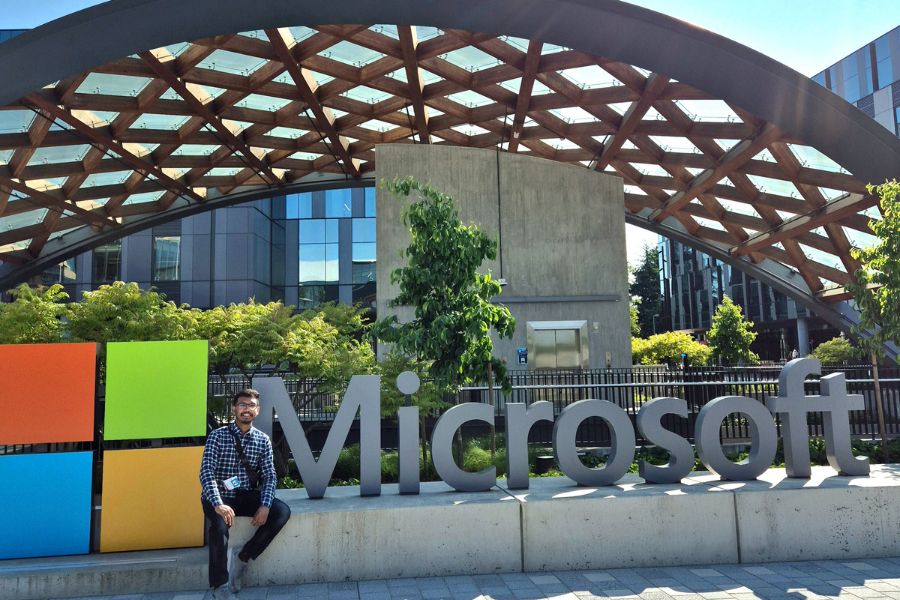MEM graduate student Vignesh Viswanathan and his team capture first place in Microsoft competition

Vignesh Viswanathan, a graduate student in Purdue's Master of Engineering Management program, was part of the team that took first place in the Microsoft Global Intern Hackathon with EchoFrame — an AI-driven marketing agent that transforms raw customer feedback into emotionally resonant visuals within seconds. This innovative project was developed during the Intern Celebration Week under the theme “Hack for Marketing AI Assets.”
The hackathon was a global event where Microsoft interns from across teams and locations came together to collaborate, innovate and build solutions around emerging themes.
Open to all interns regardless of role or geography, the event offered a unique opportunity to work cross-functionally, explore Microsoft technologies and showcase ideas to senior leaders. Past global hackathons have seen ideas like the Intelligent Construction Portal turn into real-world solutions.
Vignesh details the award-winning project, discusses his long-term goals and emphasizes the role of Purdue’s Master of Engineering Management (MEM) program in shaping his career path.
Can you describe the project, its use, and how it might be used by Microsoft? How is this different from what is currently used?
EchoFrame is an AI-powered marketing agent designed to help Microsoft transform raw customer feedback into emotionally resonant marketing content. Instead of relying solely on performance metrics like clicks or impressions, EchoFrame taps into the emotional layer of user feedback to understand how customers genuinely feel about a product experience. It identifies emotional cues such as frustration, delight, confusion, or excitement and extracts them from customer feedback.
Building on that, EchoFrame goes a step further by analyzing whether there are existing Microsoft features that already address the feedback being expressed. By mapping emotional insights to current product capabilities, it uncovers opportunities to surface features that may already solve user pain points but suffer from low discoverability.
Once this analysis is complete, EchoFrame generates short-form marketing content like product headlines, blog content and social media posts that reflect the user’s sentiment and highlight the relevant Microsoft features. This enables marketing teams to craft content that is not only informative but also authentic, empathetic and user aligned.
By amplifying under-discovered features through emotionally resonant content, EchoFrame empowers teams to better connect with users and showcase the value of Microsoft’s offerings in a more meaningful way.
What does the win mean to you?
Pretty buzzed to have won it. It always feels good when your efforts are recognized. Winning an Xbox as a result of this was definitely the cherry on top!
Who were the members of your team?
We had a diverse team of interns from both the U.S. and India. It included software engineering interns, a design engineer intern and me as the product manager intern.

What was your role as Product Manager?
I worked on shaping the overall product idea, defining the user flow and ultimately presented the final concept along with one of the software engineer interns.
How did you work together as a team?
Since we were spread across locations, all our collaboration happened virtually. Despite the distance, it was a really smooth and enjoyable experience.
What did you learn? What are the next steps?
Before coming to Purdue, I was a software engineer at Visa. This internship at Microsoft is my first experience in a product management role, and the hackathon reminded me why I made that switch. I love ideating on products and seeing them through. Working on the hackathon was a great experience and made my summer at Microsoft even more memorable. It also reinforced the importance of staying in touch with advancements in AI and being equipped to apply it in meaningful ways. As AI continues to evolve rapidly, being able to leverage it thoughtfully and responsibly is becoming a key skill for people across different roles.
What was Microsoft’s role in the Hackathon?
The hackathon was part of Intern Celebration Week, organized for all the interns of Microsoft globally. It gave us interns the chance to explore Microsoft products, connect with others across the company and build something creative outside our regular roles.
What are your future goals?
I want to keep building products that have meaningful consumer impact at scale and continue growing in the product management space.
How has Purdue’s MEM program helped?
Purdue’s MEM program gave me the flexibility to explore courses across different domains based on my interests, which was incredibly valuable as I transitioned into product management. Courses like Engineering Leadership, Marketing Management and Cognitive Engineering helped me develop a user-centric mindset, understand human factors in design and evaluate decisions through a business lens. Overall, the program gave me a broader perspective, and those learnings have played a big role throughout my internship at Microsoft. We have some incredible folks at the helm of the MEM program: Eric VandeVoorde, Karen Hull, Kati Hutsell, Rendi Tharp and Tyler West, who’ve made the experience all the more wonderful.
What was the biggest lesson learned from MEM?
The importance of thinking deeply about the problem before jumping to the solution — something that’s absolutely crucial in product management. One of the key skills I gained was the ability to identify gaps in products and ask the right questions early on. The program helped me develop the mindset of thinking beyond the "how" and focusing on the "why," and that shift has held me in good stead throughout my internship experience.
What advice would you give to others considering a master’s in engineering management?
If you're someone looking to grow at the intersection of technology, business and leadership, regardless of whether you come from a technical background, MEM is a great platform. It gives you the flexibility to shape your path, whether you're aiming for product management, operations, strategy, or supply chain. The program helps you build both the language and mindset to navigate complex, cross-functional problems and opens up career paths you might not have considered before.
Whether you’re pivoting from engineering or exploring something new altogether, MEM equips you with the tools to think holistically and make a real impact.
